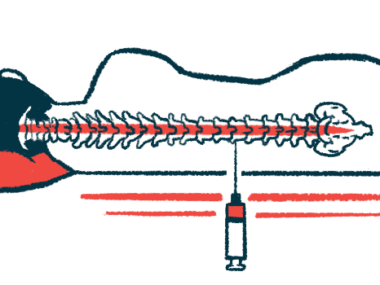Giving Thanks When It’s Not Easy
Written by |

November is a month of personal celebrations and Thanksgiving, a favorite holiday. We’re prompted all month via marquees and commercials to give thanks.
We shouldn’t need prompting. And it shouldn’t be a one-month effort.
Granted, life isn’t easy for many. However, it usually takes little effort to find someone with a life challenge you’re thankful isn’t yours.
That hit home repeatedly during our brief SMA assignment, almost 25 years ago.
***
My husband, Randy, and I were thrilled when our first baby, Matthew, was born. Three years later, we were equally delighted when he was joined by his sister, Katie. Our family was complete!
God snickered. Shortly after our move to the North Carolina mountains, our family excitedly prepared for a surprise third baby! Jeffrey blessed us with an early arrival on May 18, 1997.
Alas, God wasn’t finished. Two months later, Jeffrey was diagnosed with SMA type 1. Back then, the prognosis was devastating: probable death before the second birthday.
I needed a big shove at that time to find something to be thankful for, but I found it.
Matthew and Katie were healthy. And Jeffrey was happy.
***
Almost three months after the diagnosis, Randy and I took Jeffrey to a pulmonologist for a consultation. By then, my pity parties were impressively small in number and intensity. I’d discovered we could still give thanks even with SMA. Matthew and Katie seemed to be holding up remarkably well, Randy always picked up the slack when I needed an “adjustment,” and we had no reason to believe that Jeffrey was in pain. He certainly knew he was loved!
On that fateful day, Oct. 6, 1997, giving thanks took a twist.
The pulmonologist made an unfortunate decision that resulted in Jeffrey going into respiratory arrest in the office. An ambulance was summoned to take us to the emergency room just across the parking lot. I was most thankful for the proximity, although the ride, painfully slow, seemed excruciatingly long.
Once in the ER, Jeffrey experienced a second round of respiratory arrest. The medical folks shoved tubes down his throat as he drifted away, and a horrifying image of finding a pillow to end this torture flashed through the remains of my mind. I was mortified at the thought, thankful that it was just a thought, and pondered just how far I’d go to “save” our baby.
I was thankful Randy was right beside me.
***
Yearning for something positive after the gut-wrenching intrusion of SMA, Randy and I somehow managed to broach donating Jeffrey’s organs when the time came. I was crushed to learn that it would be possible only if Jeffrey were in the hospital at the end. If nothing else, I wanted to be home when he snagged his wings.
Fast-forward to the nightmare consultation gone horribly awry. As Jeffrey lay in the ER with tubes down his throat in the horrific chain of events, Randy and I were summoned to speak with the chaplain. Despite my balking at leaving our baby for who knew what, we were both gently nudged along to speak about organ donation.
OK, maybe this was something to be thankful for. Maybe this was God’s way of enabling us to share a part of Jeffrey after he was gone. I still preferred home, though.
Incredulously, our tiny warrior held on and moved to a room for the night. As soon as he was settled in his hospital bed, he went into respiratory arrest for the third time. A nurse named Mary offered my crumbling self a hug that came straight from God. Twenty-four years later, “thankful” still doesn’t do justice.
My physician brother, Paul, drove hours for whatever was coming up. Tears of thankfulness flowed.
Again.
***
November is National Hospice and Palliative Care Month.
Upon our miraculous return home from the consultation ordeal, our home health nurse quietly suggested summoning hospice. Jeffrey was exhausted.
Palliative care, including suctioning the secretions Jeffrey could no longer manage, nursing him (increasingly, more for mere soothing), and keeping him snuggled on the pillow in my lap, had kept him comfortable. He now required the next level of care.
Our local hospice had never worked with a baby before. Mary, the nurse assigned to their tiny patient, was a godsend from the beginning. I’m still thankful for that connection. Her first order was to make sure we had morphine on hand for whenever Jeffrey needed it. The idea of giving morphine to our baby turned my stomach, but oh, how thankful I was to see how quickly and easily it squelched respiratory distress.
Thanks to Mary and hospice, Jeffrey was kept comfortable. I was kept relatively sane for the next few weeks, despite a few rough patches. I prayed that our little guy’s final breath would come peacefully with only our immediate family home. On Nov. 4, 1997, it did.
Thankful? Way beyond words.
***
Note: SMA News Today is strictly a news and information website about the disease. It does not provide medical advice, diagnosis, or treatment. This content is not intended to be a substitute for professional medical advice, diagnosis, or treatment. Always seek the advice of your physician or other qualified health provider with any questions you may have regarding a medical condition. Never disregard professional medical advice or delay in seeking it because of something you have read on this website. The opinions expressed in this column are not those of SMA News Today, or its parent company, Bionews, and are intended to spark discussion about issues pertaining to spinal muscular atrophy.





Helen Baldwin
(From Helen's mother, JoAnn Derden):
GIVING THANKS should be in our vocabulary 24 hours a day! I am aware that is a tough choice for many folks, particularly if only material things are considered. Helen’s article regarding being thankful reminds us of many reasons we need to remember how lucky we are, even if we have to wait a while to realize it.
Helen is so wise! She has figured it out that situations will always be resolved "OKAY,” regardless of how bleak the situation may be.
I don’t think Helen was smiling the instant she was born, but soon after! She has continued to bless folks with her happy disposition. She has handled hard times “like a pro” (which I guess she is!) and always comes out stronger on the other side.
Mothers can learn a lot from their daughters!
Helen Baldwin
Thanks, Mom! You and Dad raised an optimist, so you've definitely earned a good chunk of credit :)